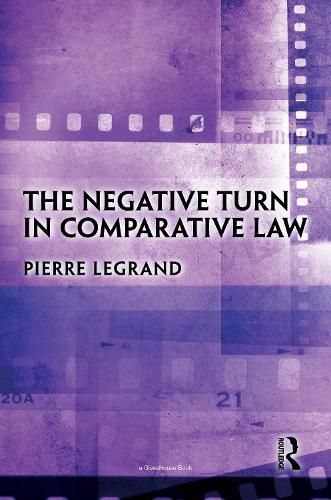Readings Newsletter
Become a Readings Member to make your shopping experience even easier.
Sign in or sign up for free!
You’re not far away from qualifying for FREE standard shipping within Australia
You’ve qualified for FREE standard shipping within Australia
The cart is loading…






This book's essays aim subversively and resolutely to replace the hegemonic discursive frame governing comparative law. Beyond harnessing negative critique to resist the orthodoxy's self-assured cognitive assumptions, at once unexamined and indefensible, the argument mobilizes negativity as an empowering idea, a resource towards the displacement of the brand of comparative law that has been fostering a closing of the comparing mind. To answer the demands of the moment and herald foreign law research as a creditable intellectual development, one requires to engage in a culturalist theorization and practice of comparative law at radical variance from the prevailing positivist model. The negative turn, then, is a call to comparative action - a comparactive motion - in support of the robustly indisciplined thinking that must thoroughly inform research into foreign law. In photography, the negative has been employed productively to generate a positive print. In comparative law, negation wants to affirm edifying epistemic yields.
This book will benefit all law teachers and postgraduate law students interested in the workings of law on the international scene, whether specialists in comparative law, public international law, private international law, transnational law, or foreign relations law - in particular, individuals bringing to bear a critical inclination to their subject-matter.
$9.00 standard shipping within Australia
FREE standard shipping within Australia for orders over $100.00
Express & International shipping calculated at checkout
This book's essays aim subversively and resolutely to replace the hegemonic discursive frame governing comparative law. Beyond harnessing negative critique to resist the orthodoxy's self-assured cognitive assumptions, at once unexamined and indefensible, the argument mobilizes negativity as an empowering idea, a resource towards the displacement of the brand of comparative law that has been fostering a closing of the comparing mind. To answer the demands of the moment and herald foreign law research as a creditable intellectual development, one requires to engage in a culturalist theorization and practice of comparative law at radical variance from the prevailing positivist model. The negative turn, then, is a call to comparative action - a comparactive motion - in support of the robustly indisciplined thinking that must thoroughly inform research into foreign law. In photography, the negative has been employed productively to generate a positive print. In comparative law, negation wants to affirm edifying epistemic yields.
This book will benefit all law teachers and postgraduate law students interested in the workings of law on the international scene, whether specialists in comparative law, public international law, private international law, transnational law, or foreign relations law - in particular, individuals bringing to bear a critical inclination to their subject-matter.